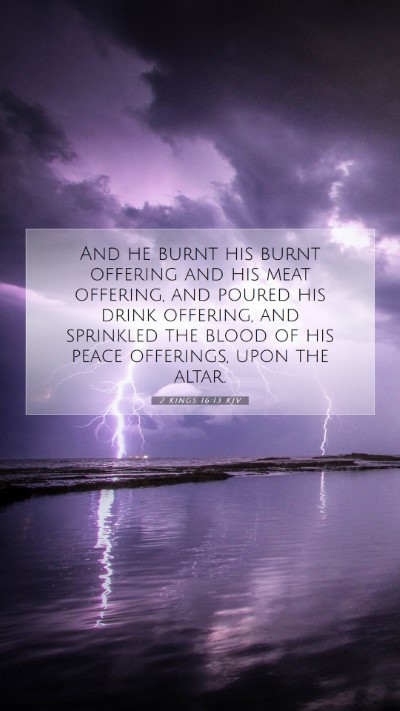Old Testament
Genesis Exodus Leviticus Numbers Deuteronomy Joshua Judges Ruth 1 Samuel 2 Samuel 1 Kings 2 Kings 1 Chronicles 2 Chronicles Ezra Nehemiah Esther Job Psalms Proverbs Ecclesiastes Song of Solomon Isaiah Jeremiah Lamentations Ezekiel Daniel Hosea Joel Amos Obadiah Jonah Micah Nahum Habakkuk Zephaniah Haggai Zechariah Malachi2 Kings 16:13 Meaning
What is the meaning of 2 Kings 16:13?
And he burnt his burnt offering and his meat offering, and poured his drink offering, and sprinkled the blood of his peace offerings, upon the altar.
2 Kings 16:13 Bible Verse Meaning
Interpretation of 2 Kings 16:13
Bible Verse: 2 Kings 16:13
Summary: This verse provides insight into the reign of King Ahaz of Judah and his actions concerning the worship of God and idolatry.
Contextual Background
Understanding 2 Kings 16:13 requires a look at the historical and spiritual context of King Ahaz's reign. He was a king of Judah who reigned during a turbulent time, marked by political strife and spiritual decline.
Ahaz was known for his allegiance to foreign powers and the adoption of their pagan practices. This often put him at odds with the Judeo-Christian covenant and the worship of Yahweh.
Bible Verse Meaning
This verse illustrates Ahaz's actions in the temple, showing a clear shift from traditional worship of Yahweh to the incorporation of foreign gods, highlighting a significant moment of apostasy:
- Idolatry: Ahaz's choice to follow pagan rituals marked a departure from the covenant traditions of Israel.
- Pagan Influences: By embracing pagan practices, he allowed external influences to corrupt the worship in the temple.
- The Temple's Purpose: The temple was intended to be a holy place for the worship of God, but Ahaz altered its practices for political gain.
Public Domain Commentaries Insights
Matthew Henry: Matthew Henry emphasizes the spiritual implications of Ahaz's actions. He reflects on how Ahaz's decisions set a precedent for future generations, leading them away from true worship. Henry warns that such choices can lead to national calamity.
Albert Barnes: Barnes notes the irony in Ahaz seeking help from foreign nations while simultaneously betraying God. He states that these actions reveal a lack of faith and trust in God's power to protect and guide.
Adam Clarke: Clarke highlights the dangers of worship practices evolving due to outside influences. He urges readers to recognize the significance of maintaining pure worship and the protection against idolatry, drawing parallels to contemporary worship practices.
Application for Today
The lessons from 2 Kings 16:13 are significant for contemporary believers:
- Faithfulness to God: Christians are called to remain faithful amidst external pressures that may lead to normalized compromise in faith.
- Caution Against Idolatry: Modern idols may not resemble ancient ones, yet anything that takes precedence over God can lead to spiritual decline.
- Importance of Scripture Study: Engaging in Bible study insights enables believers to discern the truth in their spiritual practices and beliefs.
Cross References
This verse relates to several other scripture passages:
- 2 Kings 16:10-12: Highlights the context of Ahaz's actions and their implications.
- Isaiah 7:1-9: Discusses the political and spiritual climate during Ahaz's reign.
- 2 Chronicles 28:22-25: Provides additional context on Ahaz's unfaithfulness to God.
Conclusion
In conclusion, 2 Kings 16:13 serves as a poignant reminder of the dangers of turning away from God in pursuit of worldly support. Through careful Bible verse explanations and scripture analysis, believers can learn from past mistakes and aspire to uphold the values of faith and devotion to God. This Bible verse commentary not only aids in understanding historical context but also encourages application in today's world.


